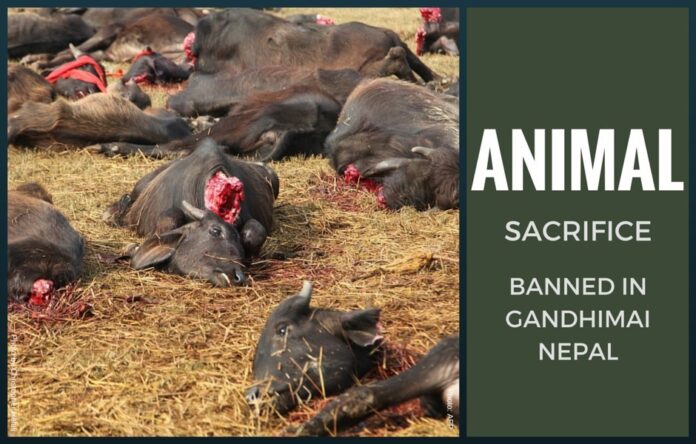
PerformanceGurus Staff
New Delhi
Facts:
- It is estimated that more than 500,000 buffalo, goats, chickens and other animals were decapitated at Gadhimai in 2009, but in 2014 the numbers had reduced by 70%.
- Among others, President Emeritus of the World Council of Arya Samaj and noted social activist, Swami Agnivesh, were at the forefront of urging Indian devotees to boycott the mass slaughter by holding a hunger strike at the heart of the temple.
- B. D. Sharma, Director General of Sashastra Seema Bal (SSB) was awarded with the ‘Leadership in Animal Welfare’ award for his exemplary contribution in curbing the illegal transport of animals to Gadhimai.
For animal lovers there is good news. The Nepal temple trust has decided to impose a ban on the ritualistic animal sacrifice at the Goddess Gandhimai festival in which millions of buffaloes, goats, and chickens are killed every five years at the feet of the deity. This ban is logical culmination of years of campaign by Animal Welfare Network Nepal(AWNN), Humane Society International (HSI) India, social activists, and intervention by the Supreme Court of India. The 300-year-old morbid ritual was held every five years.
Gauri Maulekhi, HSI/ India consultant and Trustee of the People for Animals, who petitioned India’s Supreme Court against the movement of animals from India to the Gadhimai festival, said, “This is a tremendous victory for compassion that will save the lives of countless animals. HSI/ India was heartbroken to witness the bloodshed at Gadhimai, and we’ve worked hard to help secure this ban on future sacrifices. We commend the temple committee but acknowledge that a huge task lies ahead of us in educating the public so that they are fully aware. HSI/ India will now spend the next three and a half years till the next Gadhimai educating devotees in the states of Bihar, Jharkhand, Uttar Pradesh and West Bengal on the temple trusts’ decision not to sacrifice animals. Animal sacrifice is a highly regressive practice and no nation in the modern world should entertain it.”
A press release issues by the HIS quoted, Manoj Gautam, founding member of Animal Welfare Network Nepal (AWNN) and campaigner against the Gadhimai festival, as saying , “We applaud the temple committee’s decision to end this mass slaughter of innocent animals and hope that they will continue to support us in our future endeavors for protecting animals in the country. AWNN’s progressive move to work directly with the temple committee, with Humane Society International/ India’s support has been the key that changed the whole face of the campaign and is the reason for the achievement we have now.”
The release also quoted the following statement from Gadhimai’s Temple Trust Chairman, Ram Chandra Shah:
“For generations, pilgrims have sacrificed animals to the Goddess Gadhimai, in the hope of a better life. For every life taken, our heart is heavy. The time has come to transform an old tradition. The time has come to replace killing and violence with peaceful worship and celebration.”
“Our concern has been this: how do we convince the people, so desperate for the favour of Gadhimai, that there is another way? How do we bring them on our journey? Thankfully, the dedicated efforts of the Animal Welfare Network Nepal (and Humane Society International?) has shown us the path and provided the motivation to make this transformation a reality.”
“The Gadhimai Temple Trust hereby declares our formal decision to end animal sacrifice. With your help, we can ensure Gadhimai 2019 is free from bloodshed. Moreover, we can ensure Gadhimai 2019 is a momentous celebration of life.”
– Ram Chandra Shah, Gadhimai Temple Trust Chairman
With the Supreme Court of India’s intervention to prohibit the movement of animals from India to Nepal, there was a reduction of up to 70% in the number of animals sacrificed from 2009. The Supreme Court’s order resulted in more than 100 arrests of those breaching the order, and more than 2,500 animals saved. Earlier this month the Supreme Court of India issued directions to states to set up mechanisms to prevent animals from being taken to Gadhimai in future and create awareness against animal sacrifice.
Earlier this year, following the global outrage stemming from the Gadhimai massacre, the temple committee also decided not to sacrifice any animals during the harvest festival (Sankranti). Instead, the temple officials have been confiscating the animals and caring for them until rescuers can re-home them.
- Subramanian Swamy approaches Supreme Court on Govt’s modification of 2G Scam Judgment to avoid auction of Satellite Spectrum - April 23, 2024
- Defence Minister Rajnath Singh visits Siachen. Reviews military preparedness - April 22, 2024
- Amit Shah’s shares in the Stock Market almost doubled in the past five years - April 21, 2024







